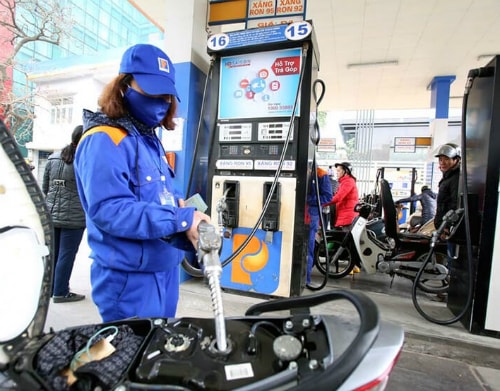Petroleum Association: People have the responsibility to pay more environmental tax
To compensate for the revenue loss from reduced import tax, leaders of the Petroleum Association support early increases in domestic taxes, including special consumption and environmental protection.
At the workshop "Vietnam's petroleum market and institutional issues" held on May 16, Mr. Phan The Rue - Chairman of the Vietnam Petroleum Association (Vinpa) expressed his agreement with the proposal to soon adjust domestic tax on petroleum products in an increasing direction, in whichAt least, special consumption tax and environmental protection tax should account for over 50% of the price structure to ensure State budget revenue. This move also aims to compensate for the reduction of import tax to 0% according to the integration commitment in the coming time.
According to the draft Law amending and supplementing the Law on Environmental Protection Tax, which was released by the Ministry of Finance for comments in January 2017, the ceiling for environmental protection tax on gasoline is proposed to be doubled, from VND4,000 per liter to VND8,000. Currently, each liter of gasoline is subject to VND3,000 in environmental protection tax, which has been in effect since May 2015. Not only gasoline, jet fuel also has its ceiling increased to 6,000 VND, while diesel, mazut, and lubricating oil are at 4,000 VND per liter. |
"Clearly, this is the responsibility of citizens to the country. If import tax is reduced but domestic tax is increased, the retail price of gasoline will not change, the price will remain the same. Because retail price depends on many types of taxes. Increasing this, decreasing that will still not change," said Mr. Rue. This recommendation has been mentioned many times by the Association, but the increase needs to have a specific roadmap.
Also at the forum, Mr. Truong Dinh Tuyen - former Minister of Trade said that in the current situation, if we want to compensate for revenue when import tax is 0%, "the path of increasing domestic tax will have to be considered in the short term". However, in the long term and fundamentally, he said that the policy needs to aim at reducing taxes to reduce costs and burdens for businesses. When creating more profits, businesses will contribute more to the budget.
 |
To compensate for the 0% import tax in the coming time, experts say that in the immediate future, it is possible to calculate an increase in domestic taxes, including environmental protection tax on gasoline. |
Contributing opinions from the perspective of financial experts, Mr.Nguyen Tien Thoa - former Director of the Price Management Department (Ministry of Finance) disagreed with the idea of collecting taxes right from the beginning of the product. According to him, if the input (round 1) is "blocked" with high tax policies, the market and people will immediately react.
"Inputs should be "eaten" less, so that production (round 2) can develop. Only then will revenue from consumption (round 3) be sustainable. The financial idea of "nurturing revenue sources" is right here," Mr. Thoa commented.The former Director of the Price Management Department said that tax adjustments need to be specifically calculated to ensure balanced revenue for the economy.
In addition to increasing fees and taxes to compensate for the revenue shortfall, Vinpa leaders also believe that the petroleum market actually needs a transformation, not the current half-hearted management.
Looking at the reality of the Vietnamese retail market, Mr. Phan The Rue said that this is a big lesson. Because although there are many products that have not reached the opening date, foreign-invested enterprises (FDI) have linked up with domestic enterprises to open the market. Up to now, many FDI enterprises have owned retail establishments, brought imported goods into the market, and competed directly with domestic goods.
In that context, the pressure to protect the domestic market, especially the two Nghi Son and Dung Quat oil refineries as well as the distribution system is increasing. According to Mr. Rue, to protect domestic production, there must be technical barriers or barriers that are not prohibited by the WTO.
Currently, foreign investors have invested in the production and distribution of petroleum in the market. The Vietnam National Petroleum Group has sold 8.9% of its shares to foreign enterprises, and the joint venture invested in the Nghi Son oil refinery with capital of up to 75%. In addition, key enterprises are equitizing, which is also a condition for enterprises to invest shares to participate in the legal market.
Mr. Truong Dinh Tuyen - former Minister of Trade suggested that the policy on the gasoline market in the future must change in the direction of allowing businesses to set their own prices. This will ensure competition and not leave "prices in the hands of state management".
According to VNE
| RELATED NEWS |
|---|

